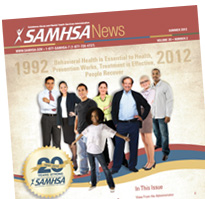SAMHSA Coping with Violence and Traumatic Events
- Disaster Distress Helpline
- For Students
- For Schools
- For Adults
- For Families
- For Responders and Health Professionals
- Information Clearinghouses
Disaster Distress Helpline
The Disaster Distress Helpline (DDH) is the nation’s first hotline dedicated to providing disaster crisis counseling. The toll-free Helpline operates 24 hours-a-day, seven days a week. This free, confidential and multilingual, crisis support service is available via telephone (1-800-985-5990) and SMS (Text ‘TalkWithUs’ to 66746) to U.S. residents who are experiencing psychological distress as a result of a natural or man-made disasters, incidents of mass violence or any other disasters. Callers are connected to trained and caring professionals from the closest crisis counseling center in the network. The helpline staff provides confidential counseling, referrals and other needed support services.
For Students
Tips for College Students: In the Wake of Trauma ![]()
Half of Us: An interactive Web site striving to decrease stigma around mental health in the college community.
For Schools
Responding to a School in Crisis: Resources for school personnel.
Tips for Talking to Children: Interventions At Home for Preschoolers to Adolescents ![]()
Tips for Talking to Children After a Disaster: A Guide for Parents and Teachers: Children respond to trauma in many different ways. Some may have reactions very soon after the event; others may seem to be doing fine for weeks or months, then begin to show worrisome behavior. Knowing the signs that are common at different ages can help parents and teachers to recognize problems and respond appropriately.
Department of Education Safe & Drug-Free Schools: Guidance for school administrators, publications, organizations that can help, and other general information on keeping schools safe and drug-free.
Youth and School Violence Prevention Resources: Browse more than 50 Federal documents and Web sites covering important issues around youth and school violence prevention. Find out more about violence prevention programs, organizations and agencies supporting prevention, and the reports released by the Federal Government.
For Adults
Tips for Suvivors of a Traumatic Event: Managing Your Stress ![]()
Disaster Tips Wallet Card: Having Trouble Coping? (English) ![]() (Espanol)
(Espanol) ![]()
Tips for Survivors of Traumatic Events: Self-Care Tips for Dealing with Stress: ![]() This fact sheet includes care tips for survivors of a traumatic event, what to expect in your personal, family, work, and financial life.
This fact sheet includes care tips for survivors of a traumatic event, what to expect in your personal, family, work, and financial life.
Recovering Your Mental Health: Dealing with the Effects of Trauma: A Self Help Guide: a self-help guide for dealing with the effects of trauma.
For Families
Guide for Parents and Educators: Tips for Talking to Children and Youth After Traumatic Events ![]()
Tips for Talking to Children: Interventions At Home for Preschoolers to Adolescents ![]()
Tips for Talking to Children After a Disaster: A Guide for Parents and Teachers: Children respond to trauma in many different ways. Some may have reactions very soon after the event; others may seem to be doing fine for weeks or months, then begin to show worrisome behavior. Knowing the signs that are common at different ages can help parents and teachers to recognize problems and respond appropriately.
Helping Your Child Manage Distress in the Aftermath of a Shooting: tips developed by the American Psychological Association.
For Responders and Health Professionals
Guide for Emergency Response and Public Safety Workers: Tips for Managing and Preventing Stress ![]()
Tips for Emergency and Disaster Response Workers: Possible Alcohol and Substance Abuse Indicators ![]()
Mental Health Response to Mass Violence and Terrorism: This manual contains "the basics" of what mental health providers, crime victim assistance professionals, and faith-based counselors need to know to provide appropriate mental health support following incidents involving criminal mass victimization. The manual is primarily for mental health professionals, yet all service providers will find much of the material to be useful. PDF| 300kbytes
Mental Health Response to Mass Violence and Terrorism, A Field Guide: This Field Guide is intended for mental health and disaster workers; first responders; government agency employees; and crime victim assistance, faith-based, healthcare, and other service providers who assist survivors and families during the aftermath of mass violence and terrorism. All who come in contact with victims and families can contribute to restoring their dignity and sense of control by interacting with sensitivity, kindness, and respect. This Field Guide provides the basics of responding to those in crisis.
Field Manual for Mental Health and Human Service Workers in Major Disasters: This Field Manual is intended for mental health workers and other human service providers who assist survivors following a disaster. This pocket reference provides the basics of disaster mental health, with numerous specific and practical suggestions for workers. Essential information about disaster survivors' reactions and needs is included. "Helping" skills are described with guidance for when to refer for professional assistance. Strategies for worker stress prevention and management are presented in the last section.
Psychosocial Issues For Children And Families In Disasters -- A Guide For The Primary Care Physician: The focus of this manual is on how the child health care provider may better prepare, assess, and treat youngsters and their families in the event of a disaster. As a recognized leader in a community, the physician also may be called upon to address community needs in case of such events. This manual also will aid the physician in assuming this role.
Information Clearinghouses
SAMHSA Disaster Technical Assistance Center
The Disaster Technical Assistance Center (DTAC) supports SAMHSA’s efforts to prepare States, Territories, and local entities to deliver an effective behavioral health response during disasters. We support collaboration between mental health and substance abuse authorities, Federal agencies, and nongovernmental organizations. The SAMHSA DTAC provides consultation to review disaster plans, conducts literature reviews, and brokers knowledge and support.
The National Child Traumatic Stress Network
The National Child Traumatic Stress Network was established to improve access to care, treatment, and services for traumatized children and adolescents exposed to traumatic events.
- FacebookExternal link. Please review our Disclaimer
- FlickrExternal link. Please review our Disclaimer
- RSS FeedsExternal link. Please review our Disclaimer
- SAMHSA BlogExternal link. Please review our Disclaimer
- TwitterExternal link. Please review our Disclaimer
- YoutubeExternal link. Please review our Disclaimer
- HHS Laws & Regulations
- The No FEAR Act
- e-Gov Content Inventory
- Health Insurance Portability and Accountability Act of 1996 (HIPAA)
- The President's New Freedom Commission on Mental Health
- Healthy People 2010
- The Children's Health Act of 2000 (Public Law 106-310)
- Confidentiality of Alcohol and Drug Abuse Patient Records (42 CFR, part 2)



